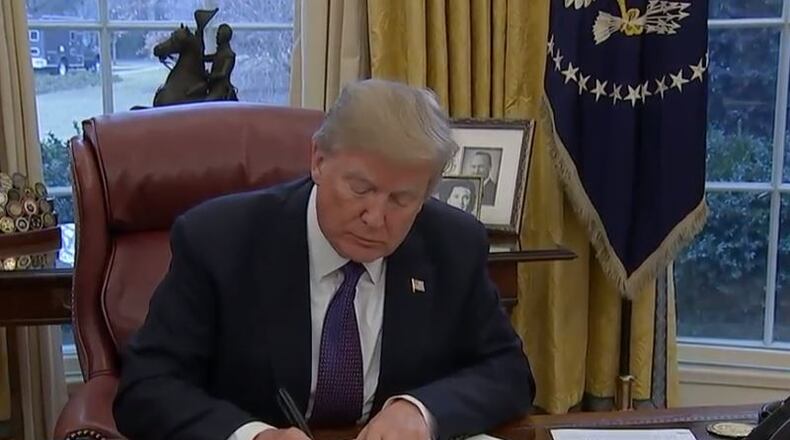After months of tough talk about defending U.S. businesses against cheap imported goods, President Donald Trump on Tuesday officially signed off on new tariffs on imports of certain washing machines and solar power equipment, following through on his campaign vows to make trade work better for American companies.
"Our companies will not be taken advantage of anymore," the President told reporters at the White House, repeating a common theme from his campaign for the White House.
In a signing ceremony in the Oval Office, the President officially accepted a recommendation from the U.S. International Trade Commission, which investigated specific trade complaints about imported washing machines and solar panels, and recommended higher tariffs for four years.
"There won't be a trade war, by the way - there will only be stock increases for the companies in this country," the President predicted, brushing off warnings about his tariff decisions possibly sparking retaliatory measures by China and South Korea.
Under the plan, there will be an immediate 30 percent tariff on most imports of solar energy components, as well as a 50 percent tariff on larger imported washing machines.
"My administration is committed to defending American companies, and they've been very badly hurt, from harmful import surges that threaten the livelihood of their workers," the President said.
"We're bringing business back to the United States for the first time in many, many years," he added.
The President's tariff move came as American negotiators began a new week of talks Tuesday in Montreal on changes to the North American Free Trade Agreement (NAFTA), with officials from Canada and Mexico working on possible changes to that trade deal.
Mr. Trump has made clear he wants the details of NAFTA to be rewired, as he charges that U.S. businesses are being treated unfairly in some trade areas, threatening at times to tear up the deal.
The immediate reaction in Congress and the business community to the President's tariff decision was mixed, as some lawmakers said the moves could cost jobs and hurt consumers - the exact opposite of Mr. Trump's argument.
"Here's something Republicans used to understand," said Sen. Ben Sasse (R-NE). "Tariffs are taxes on families."
Sen. John McCain (R-AZ) echoed Sasse, saying the move was "nothing more than a tax on consumers."
"This is shortsighted and will cost American jobs," said Rep. Mark Sanford (R-SC), who said solar power industry jobs were now at stake in his home state, as that industry denounced the move.
But for others, the higher tariffs will help preserve jobs, threatened by less inexpensive imports.
"This is welcome news for the thousands of Whirlpool workers in Clyde, Ohio, whose jobs have been threatened by a surge of cheap washers,” said Sen. Sherrod Brown (D-OH).
"Whirlpool has had to fight a series of cases against companies who would rather cheat than compete," said Brown's colleague, Sen. Rob Portman (R-OH).
About the Author
The Latest
Featured



